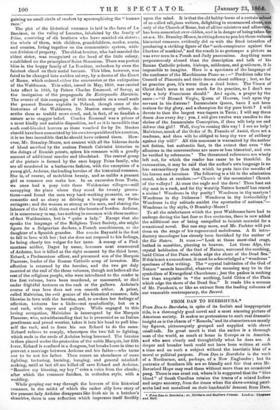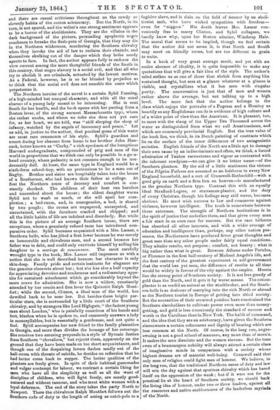FROM DAN TO BEERSHEBA.*
From Dan to Beersheba, in spite of its foolish and inappropriate tide, is a thoroughly good novel and a most amusing picture of American society. It makes no pretensions to such real dramatic insight as is the charm of " Roruola,"and its characters are mostly lay figures, picturesquely grouped and supplied with clever small-talk. Its great merit is that the author is a thorough man of the world, as much at home in Europe as in America, and who sees clearly and thoughtfully wbat he does see. A deeper and broader book could not have been written at such a time and on such a subject without the inartistic bias of a moral or political purpose. From Dan to Beersheba is the work of a Northerner, and, perhaps, of a New Englander ; but its portraits of Southern life are so friendly and fair that even Mr. Beresford Hope may read them without more than an occasional pang. There is one cruel cut, where it is suggested that the " blue blood" of South Carolina retains the traces of a mixed Indian and negro ancestry, from the times when the slave-owning patri- archs had not moralized on their handmaids' descent from Ham,
and there are casual criticisms throughout on the rowdy or slovenly habits of the cotton aristocracy. But the North, in its turn, is not spared, and the writer's one strong sentiment appears to be a horror of the abolitionists. They are the villains in the dark background of the picture, persuading apoplectic negro coachmen to forsake the flesh-pots of Georgia, that they may die in the Northern wilderness, murdering the Southern chivalry when they invoke the aid of law to reclaim their chattels, and themselves skulking out of the danger which they bribe needy agents to face. In fact, the author appears fully to endorse the view current among the more thoughtful friends of the South in this country, that negro slavery is a social evil, and that all who try to abolish it are criminals, actuated by the lowest motives. As a Federal, however, he is so far blinded by prejudice as to think that the social evil does not ennoble the caste which perpetuates it.
The Northern heroine of the novel is a certain Sybil Fanning, of a high-minded but unequal character, and with all the usual charms of a young lady meant to be interesting. She is sent South for her health, and the book opens with her parting from a Boston lover, of the strong earnest Massachusetts type, whom she rather snubs, and whom we infer she does not yet care for, as her heart, we are told, was " still sleeping the sleep of infancy, watched by the angels of innocency and peace." Let us add, in justice to the author, that poetical gems of this water are most rare ornaments of his style. Sybil's guardian and escort during her absence from home is her brother John Han- cock, better known as "Cocky," a rich specimen of the bumptious Harvard undergraduate, compounded of prig and man of the world in proportions that we think can only be possible in a go-a- head country, where pedantry is not common enough to be irre- deemably dull. At least, the same type in England would be a sixth-form school-boy, with no pretensions to be a man out of Rugby. Brother and sister are hospitably taken into the house of a Southerner, who had known their father at college. At first the Northern sense of decency and comfort is con- stantly shocked. The children of their host run barefoot and uncombed about the house ; the eldest daughter warns Sybil not to wash so much, or she will spoil her com- plexion ; a bed-room, and, in emergencies, a bed, is shared by two people ; the rooms are unpapered, uncarpeted, and uncurtained, with the furniture cracked and chipped ; and all the little habits of life are indolent and disorderly. But while this is the picture of an average Southern house, there are exceptions, where a genuinely refined taste has introduced com- parative order. Sybil becomes acquainted with a Mrs. Lamar, a Southern belle, who has jilted a first lover because he was merely an honourable and chivalrous man, and a second because her father was in debt, and could only extricate himself by selling his daughter to a mariage de convemnce. The most carefully wrought type in the book, Mrs. Lamar still impresses us with a notion that she is well described because her character is only skin-deep. Family pride and certain instincts for elegance are the genuine elements about her ; but she has also a half capacity for appreciating devotion and tenderness and a rudimentary appe- tite for sustained attachment which go considerably beyond the mere crave for admiration. She is now a widow, constantly attended by her cousin and first lover the Quixotic Ralph Mont- fort; while the second, Clinton, a blasé man of the world, has dawdled back to be near her. But besides these bright par- ticular stars, she is surrounded by a little court of the Southern chivalry, and by strangers like Lord Highgate, " the fastest young man about London," who is painfully conscious of his hands and feet, blushes when he is spoken to, and commonly answers a lady in monosyllables, but is essentially a gentleman, and not quite a fool. Sybil accompanies her new friend to the family plantation in Georgia, and more than divides the homage of her entourage.
She receives two amusing proposals in a style of Byronic fustian from Southern "chevaliers," but rejects them, apparently on the ground that they have been made on too short acquaintance, and though one of the despairing lovers dashes madly out of the ball-room with threats of suicide, he decides on reflection that he had better come back to supper. The better qualities of the planters are freely given. In spite of their habitual gasconades and vulgar contempt for labour, we contract a certain liking for men who have all the simplicity as well as all the want of discipline of children, who will fight freely, are mostly good- natured and without rancour, and who treat white women with a loyal deference. The end of the story takes the party North to Newport. There the chivalrous Ralph Montfort follows out the Southern code of duty to the length of acting as catch-pole to a fugitive slave, and is slain on the field of honour by an aboli- tionist mob, who have wicked sympathies with freedom— even for "niggers." His death leaves Mrs. Lamar con- veniently free to marry Clinton, and Sybil collapses, we hardly know why, upon her Boston admirer, Winthrop Hale. The moral that seems to be implied, though we feel certain that the author did not mean it, is that North and South may meet on friendly terms, but are too different in grain to unite.
In a book of very great average merit, and yet with an entire absence of ideality, it is quite impossible to make any quotations that will give a fair idea of the style. The author's mind strikes us as one of those that shrink from anything like sustained thought, but sees at a glance whatever at a glance is visible, and crystallizes what it has seen with singular purity. The conversation is just that of men and women rather above the average, but not talking up to a high level. The mere fact that the author belongs to the class which enjoys the portraits of a Pogram and a Hominy as heartily as any Englishman can do is evidence of high culture and of a wider point of view than the American. It is pleasant, too, to meet with the slang of the Upper Ten Thousand across the water as distinguished from what we call Americanisms, and which are commonly provincial English. But the true value of the book lies, we think, in its Dutch painting of contrasts which lie on the surface of the inner differences of two antagonistic societies. English friends of the North are a little apt to damage their own cause by an indiscriminate and often, we think, a forced admiration of Yankee earnestness and vigour as contrasted with the inherent rowdyism—we can give it no better name—of the Southern planters. By the aid of a little sentiment the virtues. of the Pilgrim Fathers are assumed as an heirloom in every New England household, and a sort of Cromwell-Rothschild—with a good grip on earth and a firm lien on heaven—is manufactured as the genuine Northern type. Contrast this with an equally ideal Strafford-Legree, or statesman-planter, and the duty of every Christian, though his feelings may still waver, becomes obvious. He must wish success to law and commerce against violence, however intelligent. The truth is somewhere between these extremes. The strength of Northern institutions is in the spirit of justice that underlies them, and that gives every man a fair start in an even race for success. But the race hitherto. has absorbed all other interests, and with a wider average of education and intelligence than, perhaps, any other nation pos- sesses, the Northerners have produced fewer great thoughts and great men than any other people under fairly equal conditions. They admire results, not purpose ; comfort, not beauty ; what is big rather than what is great. Between Athens under Pericles, or Florence in the first half-century of Michael Angelo's life, and the first century of the greatest experiment in self-government that the world has yet seen, the difference of results to all time would be widely in favour of the city against the empire. Herein lies the strong point of Southern society. It is not less greedy of gold than the North, and it gets it by worse means. The cotton- planter is as sordid an animal as the stockbroker, and the South- ern belle is as desirous of marrying into the rich North or abroad as the Northern tourist in Europe of getting into titled society. But the necessities of their accursed position have constrained the Southern slaveholders to cultivate power even more than money- getting, and gold is less consciously the standard of success and worth in the Carolinas than in New York. The habit of command, and the idea that they are an aristocracy, have given the Southern slaveowners a certain refinement and dignity of bearing which are less common at the North. Of course, in the long run, negro- owning is not a good school of manners, any more than of morals. It makes the men dissolute and the women slovens. But the tone even of a brammagem nobility will always attract a certain class of imaginative minds in comparison with a society whose highest dreams are of material well-being. Cromwell said that only men of religion could fight men of honour. We believe, in the long run, that the traditional Northern sense of duty and law will win the day against that spurious chivalry which has based itself on the oppression of the weak ; but if it were not for the practical lie at the heart of Southern society, we should back the living idea of honour, under two or three leaders, against all the resources and native stubbornness of the leaderless myriads, of the'North.



































 Previous page
Previous page